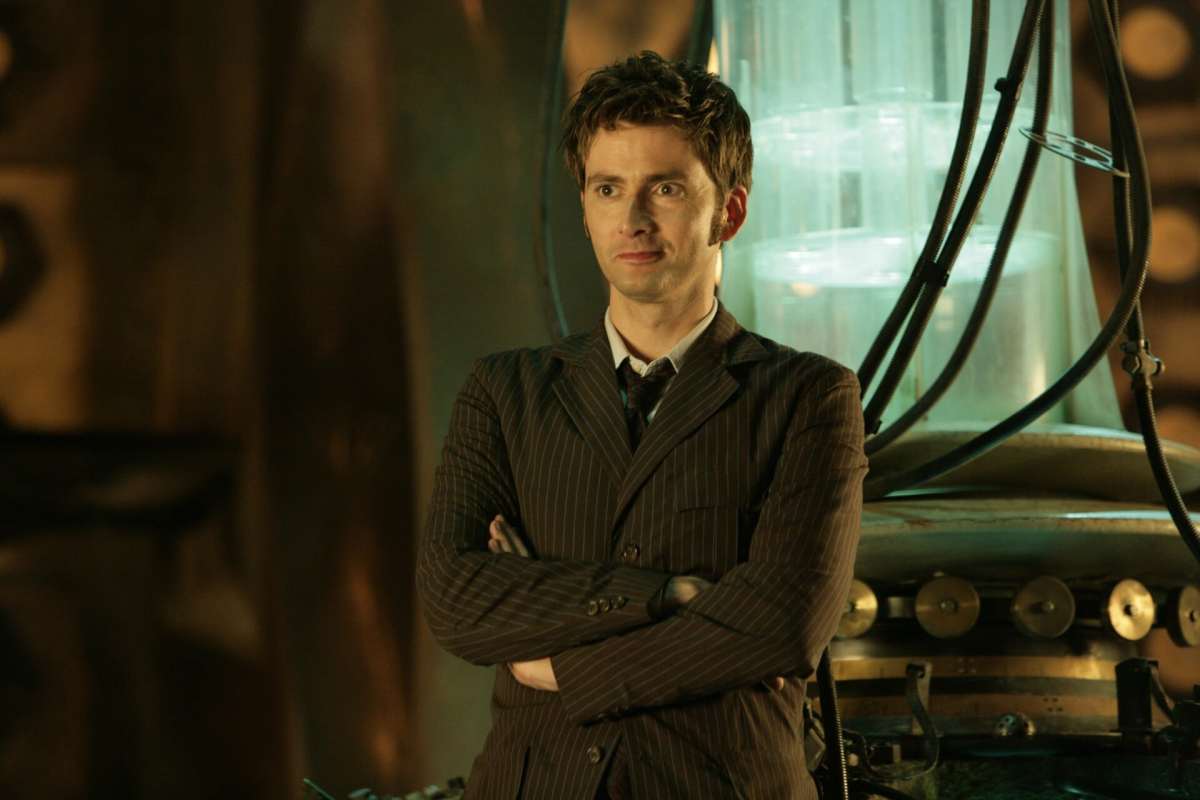There is a solid argument that Russell T. Davies is the second most important creative figure in the history of Doctor Who, behind only the show’s founding producer, Verity Lambert.
Doctor Who has always had strong creative personnel to guide it though volatile times. Barry Letts oversaw the transition from black-and-white into color, retooling the show’s core premise. Steven Moffat inherited a quirky British institution and made it a truly global phenomenon. Even script editor Andrew Cartmel, who oversaw the final years of the original run, infused the show with a counter-cultural energy that sustained it through the long “wilderness years” of cancellation.
However, Davies managed nothing short of a miracle. In its original incarnation, Doctor Who had slowly devolved into a joke and a punchline over its 26 seasons on the air. It was famously hated by BBC Director General Michael Grade, who contended, “What we were serving up as science fiction was garbage.” Ratings declined. Hardcore fans were recruited as “unofficial continuity consultants,” leading to more insular and alienating storytelling. There was even an embarrassing charity single.
Despite Cartmel’s work, Doctor Who was beyond saving and was put to rest in December 1989. Recognizing the potential of the brand, the BBC made several attempts to revive Doctor Who during the years that followed. There was an attempt to relaunch Doctor Who as an American television series starring Paul McGann, shot in Vancouver and produced with Fox, following the model of something like The X-Files. There were plans for a web series starring Richard E. Grant.

None of these approaches really gained traction. It was Davies who resurrected a failed cult television show that had been off the air for over a decade and a half and turned it into appointment viewing. Under Davies, Doctor Who became a flagship show for the BBC. Even Grade conceded that Davies had reworked the show as a “classy, popular triumph.” His last season finale was the most-watched program on British television that week, a huge triumph.
It appears that Davies has been asked to save Doctor Who yet again. Earlier this year, both current showrunner Chris Chibnall and lead actor Jodie Whittaker announced they would depart Doctor Who following their third season together and a couple of wrap-up specials. There was no immediate announcement of Chibnall’s successor. It was confirmed on Friday that Russell T. Davies would be returning to the TARDIS to oversee both the show’s 60th anniversary special and “series beyond.”
This is a big deal, to put it mildly. To be fair, the notion of a previous showrunner returning to Doctor Who is not unprecedented. Terrence Dicks and Robert Holmes both contributed scripts years after serving as script editors. Andrew Cartmel, Russell T. Davies, and Steven Moffat all published tie-in novels after their time running the series. Barry Letts was credited as executive producer on John Nathan Turner’s first year as producer but rejected any inference that he was calling any shots.
This is the first time that a previous showrunner has resumed the role after an extended gap. It’s particularly notable given that Davies has been keeping himself busy since his departure. In many ways, Davies has spent the past decade and a half fulfilling his potential as one of British television’s great dramatists, overseeing critically successful and popular miniseries like A Very English Scandal, Years and Years, and It’s a Sin.

Davies does not need Doctor Who. While working on Doctor Who, Davies corresponded with journalist Benjamin Cook about the experience of managing the show’s production. The resulting book, The Writer’s Tale, is one of the most insightful and honest books about television ever written. It presents Davies’ tenure as showrunner as both fulfilling and exhausting. Davies offers accounts of staying up all night rewriting scripts, barely sleeping, losing track of time, and feeling drained.
One gets a sense that showrunning Doctor Who is not a job to which Davies returns lightly. It is, of course, interesting to speculate about the circumstances that led to this. It seems likely that at least some of it was protective. His successor, Steven Moffat, walked away from making The Adventures of Tintin with Steven Spielberg to take over the show because he felt it was “the proper duty of every British subject to come to the aid of the TARDIS.” Davies himself had to talk the BBC out of “plans maybe to consider ending it” when Davies and actor David Tennant left in 2009. His successor, Steven Moffat, stayed on the show years longer than planned to avoid leaving it “in the lurch” without a replacement.
There is a clear sense that Davies is not inheriting Doctor Who at its strongest. The first episode produced by Chibnall and starring Whittaker broadcast to the largest audience for the debut story of a Doctor ever. However, the show’s popularity has severely declined. Critics’ reviews are appreciably weaker than for Chibnall and Whittaker’s direct predecessors. Ratings are down. The most recent season finale had the lowest seven-day consolidated viewing figures since the series was revived.
There’s a certain irony in Davies’ return. Since he took over, Chris Chibnall has arguably been trying to recapture the tone and spirit of the Davies era, rejecting the more experimental and subversive aspects of Moffat’s tenure. Chibnall’s Doctor Who has been aggressively nostalgic for the earlier years of the revival. This is obvious in any number of ways, even if most of this nostalgia is superficial and transparent.

Davies’ big innovation had been to ground Doctor Who in the mundane life of Rose Tyler (Billie Piper). Similarly, Chibnall tried to anchor the show in the companions’ familial drama, with much of his first season given over to building a bond between Ryan (Tosin Cole) and his step-granddad Graham (Bradley Walsh). Yaz (Mandip Gill) was similarly defined by her family, with episodes built around her mother Najia (Shobna Gulati) and her grandmother Umbreen (Leena Dhingra, Amita Suman).
Chibnall’s nostalgia was occasionally more overt. Whereas Moffat had treated the Daleks as part of the tapestry of Doctor Who, peppering them in cameos and season premieres, Chibnall returned to the Davies model of using them as “event” monsters. Chibnall brought back Davies-era companion Captain Jack Harkness (John Barrowman) and Davies-era monsters like the Judoon. Chibnall even took a page directly from Davies’ book by destroying the Doctor’s home planet of Gallifrey again.
However, Chibnall’s constant attempts to emulate Davies fell flat for several reasons. Most obviously, Chibnall’s homages were shallow and superficial, rarely understanding why Davies’ elements worked as well as they did. Emulating Davies’ approach only drew attention to Chibnall’s weaknesses as a writer. None of Chibnall’s companions were as interesting or as compelling as Davies’. None of Chibnall’s dialogue was as smart or as funny as Davies’.
As such, the announcement of Davies’ return to Doctor Who feels like the perfect eulogy for the Chibnall era. Chibnall spent years offering a pale imitation of Davies, so bringing Davies back feels like the logical conclusion – even if it seems unlikely to do Chibnall any favors by comparison. There are reasons to be fearful. Returning to a previous showrunner is the very definition of a regressive and nostalgic choice, and too much of modern pop culture is regressive and nostalgic.

If the choice must be regressive and nostalgic, Davies is among the best options. While Davies may (smartly) steer the show away from Chibnall’s continuity-heavy approach built around decades-old fan theories, he is highly unlikely to regress any of the era’s strengths. Davies has been publicly supportive of Chibnall and talked about the importance of representation on screen. Even during his tenure, Davies was attacked by certain elements for bringing a “gay agenda” to Doctor Who.
Chibnall’s era will likely seem comparatively conservative beside the work either side of it. Davies seems less likely than Chibnall to have the main character declare that “the systems aren’t the problem” or to have them imagine an idyllic fantasy life as a police officer. Davies is planning the 60th anniversary, and Jodie Whittaker seems likely to play a major part in that. (Whittaker is far more likely to appear than Christopher Eccleston, Davies’ first lead actor on the show.)
So, without erasing the handful of elements of the Chibnall era that worked, Davies brings a perspective that is exactly what the show needs following Chibnall’s tenure. Davies revived Doctor Who for mass audiences. He didn’t just appeal to the base. While he peppered his scripts with Easter eggs, his primary goal was to make everyone a Doctor Who fan rather than to simply satisfy existing ones. (Davies’ script for “Love and Monsters” is a rather blistering take on a particular type of fan.)
When Davies resurrected Doctor Who, he stripped back the continuity to make it accessible. This distinguished Davies’ successful revival from failed efforts like the television movie, which opened by bringing back Sylvester McCoy from the classic show only to kill him off so he could be replaced by Paul McGann as the show’s actual lead. Davies’ pared-down approach would be welcome, given that Chibnall’s most recent finale had extended exposition dumps about Time Lord mythology.
Of course, Davies undoubtedly has a clever and fresh “take” on the concept. It seems unlikely that he would return to the role of showrunner if he didn’t have something new or interesting to bring to the table. Perhaps the biggest advantage that Davies has over Chibnall is that Davies is smart enough to know that it’s not enough to emulate past successes. The most damning criticism of the Chibnall era is that Davies isn’t even really competing with Chibnall, but instead with himself.
Still, Davies’ return might be just what the Doctor ordered.







Published: Sep 25, 2021 11:00 am